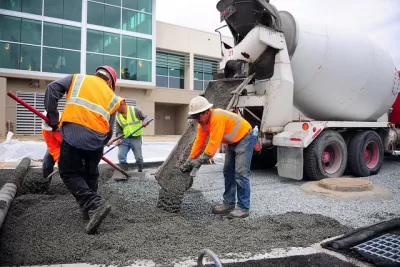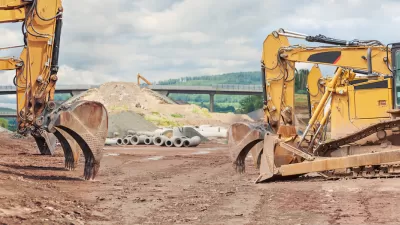Awarding federal funding via competitive grants could block grant opportunities for communities that need them the most.

As the Biden administration prepares to distribute billions in infrastructure funding to cities and states via competitive grants, some experts caution that many smaller and rural communities, lacking the institutional capacity to prepare slick grant applications and proposals, will be left out.
As Jake Blumgart writes, "Metro areas like Boston have a deep bench of experienced planners, a rich network of foundations and community development corporations, and organized business groups that push for transit and housing reform. But what about rural areas, deindustrialized Midwestern regions, or traditionally low tax and low service corners of the country like much of the American South?"
Most grants also require a 20 percent match, which may pose a challenge for poorer communities. "If federal agencies judge applicants by their capacity to draft and execute complex and resource-intensive projects, areas with smaller populations and smaller tax bases may suffer," says Blumgart. Federal funding available via competitive grants includes money for transit, brownfield remediation and climate resilience, electric vehicle infrastructure, and highway removal.
With smaller communities at a structural disadvantage, experts like Bruce Katz of Drexel University suggest the federal government could bolster capacity-building grants and improve access to grant-writing support for jurisdictions that would otherwise have a hard time catching the attention of federal officials.
FULL STORY: Smaller Cities, Poorer Regions Could Be Infrastructure Losers

Planetizen Federal Action Tracker
A weekly monitor of how Trump’s orders and actions are impacting planners and planning in America.

Maui's Vacation Rental Debate Turns Ugly
Verbal attacks, misinformation campaigns and fistfights plague a high-stakes debate to convert thousands of vacation rentals into long-term housing.

San Francisco Suspends Traffic Calming Amidst Record Deaths
Citing “a challenging fiscal landscape,” the city will cease the program on the heels of 42 traffic deaths, including 24 pedestrians.

Defunct Pittsburgh Power Plant to Become Residential Tower
A decommissioned steam heat plant will be redeveloped into almost 100 affordable housing units.

Trump Prompts Restructuring of Transportation Research Board in “Unprecedented Overreach”
The TRB has eliminated more than half of its committees including those focused on climate, equity, and cities.

Amtrak Rolls Out New Orleans to Alabama “Mardi Gras” Train
The new service will operate morning and evening departures between Mobile and New Orleans.
Urban Design for Planners 1: Software Tools
This six-course series explores essential urban design concepts using open source software and equips planners with the tools they need to participate fully in the urban design process.
Planning for Universal Design
Learn the tools for implementing Universal Design in planning regulations.
Heyer Gruel & Associates PA
JM Goldson LLC
Custer County Colorado
City of Camden Redevelopment Agency
City of Astoria
Transportation Research & Education Center (TREC) at Portland State University
Jefferson Parish Government
Camden Redevelopment Agency
City of Claremont





























